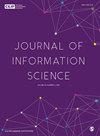Curtailing fake news creation and dissemination in Nigeria: Twitter social network and sentiment analysis approaches
IF 1.7
4区 管理学
Q3 COMPUTER SCIENCE, INFORMATION SYSTEMS
引用次数: 0
Abstract
Influencers create and facilitate dissemination of information in a network and can shape the attitudes and beliefs of members of a social network. Identifying the influencers and their relations, as well as the sentiment of tweets being disseminated in the network on some selected keywords can help curtail fake news creation and dissemination in the network. This study uses a sequential mixed-methods design with a quantitative method followed by qualitative methods. The quantitative data were collected using Mozdeh big data analysis software. Mozdeh software was used to collect tweets through Twitter’s Streaming application programming interface to build a corpus of tweets, collected from 1 January 2016 to 30 June 2021. The study found two major actors/influencers involved in the creation and dissemination of fake news on the tweeter social network studied. The study further found overall Av. Pos. − Av. Neg. was −0.9935. Data collected were on some specific trending keywords on a particular region in Nigeria. Identifying and monitoring the tweets of influencers in a network can aid in debunking fake news immediately after dissemination and discourage the use of offensive words in tweets. The results revealed major influencers responsible for creating and disseminating fake news on some trending issues in Nigeria.遏制尼日利亚假新闻的创作和传播:推特社交网络和情绪分析方法
影响者在网络中创造和促进信息的传播,并可以塑造社会网络成员的态度和信仰。识别网红和他们的关系,以及在网络上传播的推文对一些选定的关键词的情绪,可以帮助减少假新闻在网络上的产生和传播。本研究采用顺序混合方法设计,先定量后定性。采用Mozdeh大数据分析软件采集定量数据。使用Mozdeh软件通过Twitter的Streaming应用程序编程接口收集推文,构建推文语料库,收集时间为2016年1月1日至2021年6月30日。该研究发现,在所研究的推特社交网络上,有两个主要的参与者/影响者参与了假新闻的创造和传播。该研究进一步发现了总体的Av. Pos. - Av。底片。−0.9935。收集的数据是关于尼日利亚特定地区的一些特定趋势关键词。识别和监控网络中有影响力的人的推文,有助于在假新闻传播后立即揭穿假新闻,并阻止在推文中使用攻击性言论。结果显示,在尼日利亚一些热门问题上,主要的影响者负责制造和传播假新闻。
本文章由计算机程序翻译,如有差异,请以英文原文为准。
求助全文
约1分钟内获得全文
求助全文
来源期刊

Journal of Information Science
工程技术-计算机:信息系统
CiteScore
6.80
自引率
8.30%
发文量
121
审稿时长
4 months
期刊介绍:
The Journal of Information Science is a peer-reviewed international journal of high repute covering topics of interest to all those researching and working in the sciences of information and knowledge management. The Editors welcome material on any aspect of information science theory, policy, application or practice that will advance thinking in the field.
 求助内容:
求助内容: 应助结果提醒方式:
应助结果提醒方式:


